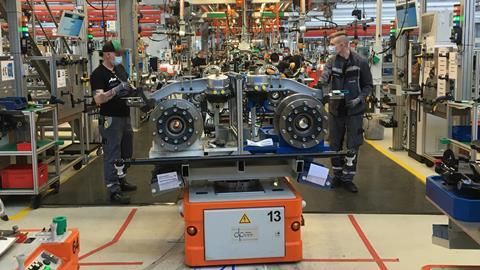
Social distancing regulations in response to the COVID-19 pandemic look set to have far-reaching implications for European truck manufacturers.
Claims last week (22 April) by the government's chief medical advisor Chris Whitty that the measures are likely to continue until at least the end of 2020 came just as some producers were making announcements about resuming production.
MAN has re-started some manufacturing this week, while both Volvo and Renault Trucks began limited production in Europe last week.
Renault Trucks began with its Lyon-Venissieux engine plant, which will be followed by its Bourg-en-Bresse and Blainville-sur-Orne factories.
However, DAF Trucks UK MD Laurence Drake indicated that in general, manufacturing output could fall by 90%, increasing lead times ten-fold if social distancing measures are maintained.
Scania also revealed it is working with longer lead times: "In terms of production, we are currently taking bespoke new orders for the October build month," Vincente Connolly, UK sales director Scania (Great Britain) told motortransport.co.uk.
"It is anticipated that by this time we will have full availability again. We can still accommodate customer orders and deliver this year for anybody who wishes to take delivery of new Scania vehicles."
Scania is planning a gradual re-opening of its plants around the world but believes the main challenge will be how quickly component suppliers are able to ramp up production rather than concerns over social distancing.
The view is shared by others including MAN, Mercedes-Benz, Renault Trucks and Volvo.
Mercedes-Benz has plans to ease supplier issues, as UK spokesman Jamie Fretwell explained: “One important measure is to switch to alternative suppliers which, for example, supply similar components for other series and can therefore be quickly enabled. The relocation of tools from one supplier to another and the use of alternative transport options are further examples of supply chain stabilisation.”
All the above manufacturers have underlined the importance to them of social distancing measures although none has been specific about how this might impact production.
Commented Dr Carsten Intra, executive board member for human resources and human resources director at MAN Truck & Bus SE: "The health and safety of our employees is of course our highest priority. Accordingly, together with our health management, we have taken many organisational measures to ensure that the necessary medical safety, hygiene and also the minimum distance between employees is fully guaranteed."
All truck manufacturers interviewed by motortransport.co.uk are adopting the same range of measures to improve the safety of their employees. These include disinfecting machinery, workstations and work tools, wearing face masks where appropriate as well as gloves and overalls.
Where social distancing is a potential problem, companies such as Renault Trucks will also specify the use of visors or a combination of mask and goggles. Other measures include keeping doors open to reduce contact with door handles, supervising movement in common areas such as canteens, changing rooms and corridors, including limiting the number of people in rooms.
Mercedes is ensuring that video conferencing is used for shift handovers, group discussions and workshops. Face-to-face events will not take place until the end of April. Separately, the company has also temporarily closed its self-service canteens.
Mercedes acknowledged that there may be an impact on deliveries but has not quantified what these might be: “We are closely monitoring current developments and adjusting our measures accordingly, continued Fretwell. "Depending on these adjustments, there may also be an impact on our vehicle deliveries. We are trying to minimise the impact on our customers. We are informing them accordingly and doing everything we can to ensure that they receive their new vehicles as quickly as possible.”
Volvo planned to start some limited production during the week commencing 20 April and then in the week beginning 4th May, to re-open final assembly plants. But according to Hannah Burgess, acting commercial director, Volvo Trucks UK & Ireland, it is too soon to assess the impact on lead times: “The situation is fluid," she said, "and there may be disruptions compared to our normal service level.”













